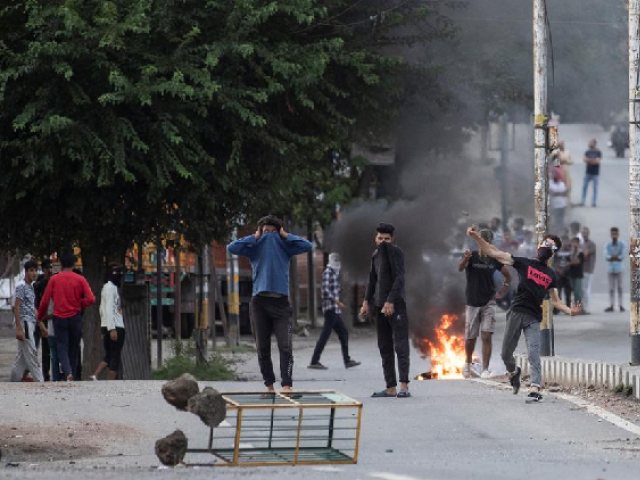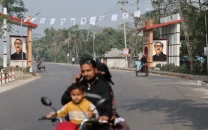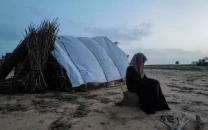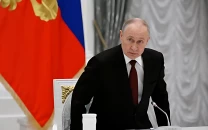Justice, not brute force, can bring peace to Kashmir: Australian civil society
Conveys its annoyance over Canberra’s deafening silence over Indian atrocities in IOK

Kashmiris protest Indian occupation in Srinagar. PHOTO: REUTERS/FILE
It also conveyed to the government of Australia in no uncertain terms that its political positioning on a humanitarian issue had left much to be desired.
The seminar titled "Searching for Peace in Kashmir", organised by Forum Australia, was held at a local restaurant last Tuesday with active participation of Kashmiri Australians, who continue to mobilise public opinion in favour of besieged Kashmiris.
The panel of eminent speakers from the Greens, academia and intelligentsia, including of Indian, Pakistani and Kashmiri origin, addressed the issue in a comprehensive manner.
Jack Waterford AM, journalist and political commentator, strongly condemned human rights violations in IOK. He supported freedom of communication, human rights for all, and self-determination for the people of Kashmir and rejected status quo in Kashmir as India, being no more sufficiently secular, was moving towards Hindutva.
Wondering at the Australian government’s double standards on Hong Kong and IOK respectively, he concluded that there could be no peace in Kashmir without justice for its residents.
Lee Rhiannon, former Greens Senator for NSW, who visited refugee camps and the Line of Control (LoC) a year ago, testified to the plight of the Kashmiri people who "desperately wanted peace". And, to achieve peace, she added, "We need justice that means fighting for their human rights and the right to self-determination".
India moves to divide occupied Jammu and Kashmir state despite protests, attacks
Sunil Gupta, vice president of Australia-India Business Council ACT, downplayed the magnitude and severity of the clampdown, spanning over two months and denied wide-spread human rights violations in IOK. Instead of addressing Indian atrocities in IOK, he alleged that Pakistan was also guilty of similar violations in Gilgit-Baltistan and Balochistan, adding that Hindus in Sindh were also being discriminated against.
He said India’s refusal to resolve the Kashmir dispute according to the UNSC resolutions or the Simla Accord stemmed from its international clout, based on economic strength. To be heard by India, he suggested haughtily, Pakistan must first develop its economic muscle, and build strength and influence.
In short, Gupta made it abundantly clear that the ‘world’s largest democracy’ believed in ‘Might is Right’ and not international law, morality and principles of inter-state relations, enshrined in the UN Charter.
Professor Tahmina Rashid rejected Gupta’s denial of human rights violations in IOK and the claim that the August 5 action was in order. Quoting extensively from the Instrument of Accession of Jammu and Kashmir (1947) and the 1964 White Paper, she established conclusively that revocation of Articles 370 and 35-A constituted a flagrant violation of not only the above instrument but also the Indian constitution itself.
She said New Delhi had unilaterally changed the basic constitutional relationship of the people of occupied Jammu and Kashmir to the Republic of India, inviting instant reaction from the Kashmiris. To suppress the reaction, India had imposed a total blackout, she said, adding that as a result, citizens had limited to no access to the outside world through phone or internet.
Prof Rashid, a diehard human rights activist, built her arguments on original sources like Amnesty International, Human Rights Watch, United Nations High Commission for Human Rights, international media, proceedings of Kashmir Assembly and even of the Indian parliament. She said India had not ratified the Convention for the Protection of all Persons from Enforced Disappearance. Indian troops and paramilitary personnel were enjoying impunity under Armed Forces Special Powers Act (AFSPA) and, without prior sanction from New Delhi, the administration could not take any punitive action against the erring soldiers.
As for sexual violence and rape, the professor shared extracts from reports of Support Group for Justice for Mass Rape Survivors, Asia Watch, Physicians for Human Rights and International People’s Tribunal on Human Rights and Justice in Kashmir, which confirmed that there was solid evidence of rape by the Indian security forces which were not prosecuted. As if that wasn’t enough, health professionals conducting the medical examinations and assisting rape victims had been tortured by the “decomposed human beings”.
Prof Rashid wondered at the double standards of the so called civilised international community which is ever-ready, and rightly so, to condemn human rights violations by non-state actors. But "when the largest secular democracy commits the same crimes against Kashmiris – women and men alike, our politics silence our conscience," she concluded in thundering applause.
Dr Ejaz Qureshi, Honorary Professor at ANU, an Australian of Kashmiri origin, succinctly encapsulated the history of their struggle for self-determination and the atrocities they had been subjected to since 1948. He reiterated their resolve to remain steadfast and expressed the hope the world would stand by their principled position and force India to fulfill its promises given to them.
Right Reverend Prof Stephen Pickard, the executive director of Australian Centre for Christianity and Culture, summed up the discussion with the remarks that peace in IOK could be achieved only through negotiations, compromise, humility and teachings of holy prophets; for which political aspirations must be given up. It was a loud and clear message for India, Australia and, in fact, the world at large.



















COMMENTS
Comments are moderated and generally will be posted if they are on-topic and not abusive.
For more information, please see our Comments FAQ